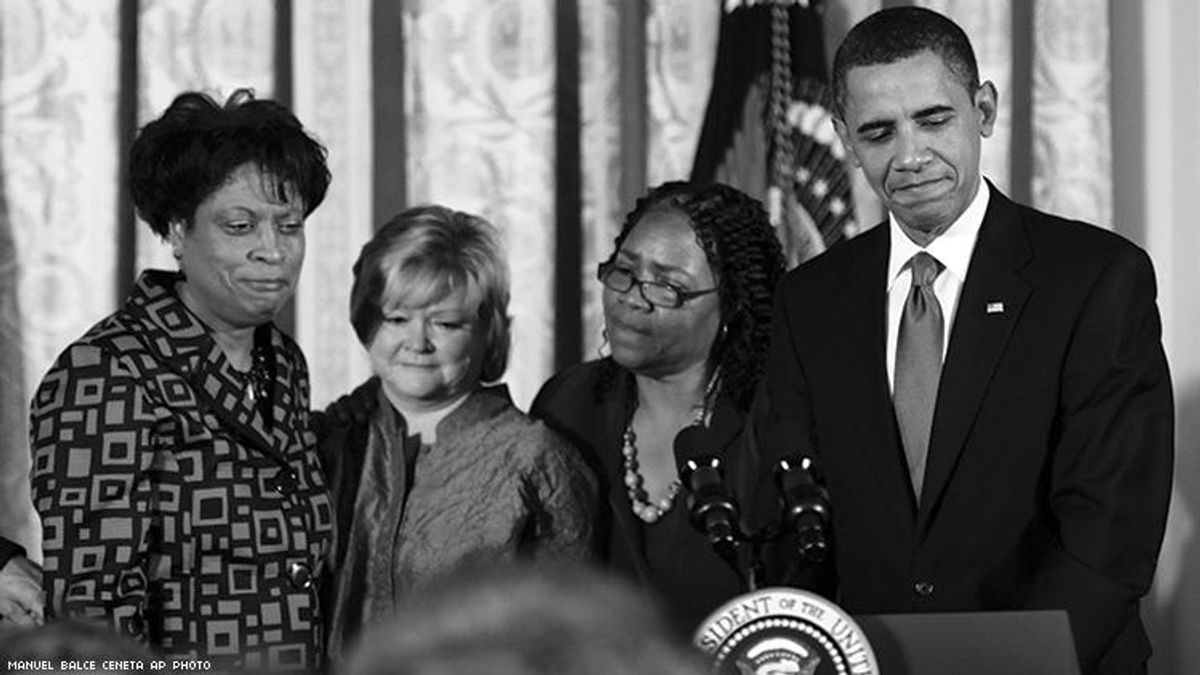Above: President Barack Obama stands with Matthew Shepard's mother Judy (middle) and James Byrd Jr.'s sisters, Louvon Harris (left) and Betty Byrd Boatner (right), during a reception commemorating the enactment of the Matthew Shepard and James Byrd Jr. Hate Crimes Prevention Act. Byrd was an African-American man who was murdered by three white supremacists in Jasper, Texas.
Following the brutal assault on Matthew Shepard near Laramie, Wyo., in October 1998, time seemed to freeze -- especially for his family. As surgeons frantically tried to save the young student's life, his family recalls receiving teddy bears from advocates across the country. Hundreds of attached cards urged his parents not to discount the opportunity to speak out on the importance of LGBTQ acceptance.
Dennis and Judy Shepard listened to those pleas and took them to heart. They founded the Matthew Shepard Foundation in December 1998, not only to continue having conversations about the importance of dignity, respect, love, and understanding, but also to continue the fight for LGBTQ equality across all arenas. Their efforts led to the passage and signing of the Matthew Shepard and James Byrd Jr. Hate Crimes Prevention Act in 2009.
For a moment, it seemed as if the nation had turned the tide against hate. Then came President Donald Trump. Before he took office, the state department funded a great deal of the Matthew Shepard Foundation's work. But since the 2016 presidential election, the foundation has received no money from the federal government -- a reality that is making its around-the-clock efforts increasingly difficult.
A great deal of the work the foundation does involves traveling to communities around the country to educate law enforcement on proper ways to report hate crimes. Fundraising efforts and pursuing corporate sponsorships have become a priority in the wake of that federal funding loss, but in no way has that slowed the organization down.
The foundation (MatthewShepard.org) continues advocating for antidiscrimination laws in every state. Without those protections, the rights of LGBTQ people are often left to the whims of landlords, bosses, and businesses.
"In 30 states right now, you can get fired for being gay," explains Sara E. Grossman, the foundation's communications manager. "So why would a person who gets beat up after coming out of a gay bar go to the police, say, somewhere in Alabama, when the police take the report, it hits the news, their boss sees it, and they get fired? Now they're out of a job as well as their safety. This is really the crux of our work."
According to a 2016 FBI report on hate crimes, 17.7 percent of the 6,121 criminal incidents reported that year were motivated by a sexual orientation bias. Unfortunately, Grossman says, there are a lot of holes in these reports. And the reporting process (and criteria) can differ from state to state. The foundation says the real number of annual criminal incidents is closer to 250,000. Particularly under-reported are the attacks against transgender people, since police often rely on out-of-date identification documentation when determining a victim's gender.
Law enforcement also has a history of deliberately misgendering and deadnaming trans people and asking all LGBTQ folks the wrong questions.
"If your car is stolen, nobody asks where you were, what you were drinking, who you were with, what you were wearing, right?" Grossman argues. "So why ask the same questions when logging hate crime reports?"
The foundation has been working with communities that are impacted the most by hate crimes -- including immigrants and people of color, Muslims, Jews, and the queer community. The mission is to connect survivors to the right people, whether it's an LGBTQ liaison at a police department or just local advocates.

Matthew Shepard was living a full life in Wyoming before he was brutally murdered in October 1998. The event that changed LGBTQ history and how we deal with hate crimes in the U.S.
"It's really empowering them to be able to be assertive and take initiative to make a [hate crime] report. Because we can go out and talk to communities day after day, week after week, month after month, but if nobody is reporting hate crimes, we don't have full data."
The organization's efforts are working, but transparent information and universal recording and reporting standards are still crucial. When talking about "reporting" and hate crimes, it's not just what crimes individuals report to the police, but whether local law enforcement classify a crime as a hate crime and report the crime to the federal government (since most hate crime legislation is federal).
Grossman notes that there have "only been two [official] hate crimes in Miami." But that's "not because it doesn't happen. The same with places like Houston and Hawaii. It's not required, so they don't report it [to the feds]. Some states like Tennessee, however, there is funding directly tied to reporting, so they do it. If we had a wish on how to edit, or improve the Shepard-Byrd Act, it would be to make these reports necessary and required."
In October, the foundation will mark the 20th anniversary of Matthew's death at their annual Denver, Colo., event, "Bear To Make A Difference." This year the teddy bear-themed event celebrating community members, civic leaders, and corporate partners will be honoring Olympian figure skater Adam Rippon, lesbian author Leslea Newman, Justin Nelson and Chance Mitchell (cofounders of the National LGBT Chamber of Commerce), and Drew Adams, a transgender high school senior from Florida who is a youth ambassador for the foundation.
Looking ahead, Grossman says social media can be a strong tool for queer youth who feel underrepresented in their community. "It's really important to create your own sense of community and safety," she muses. "If it's not available to you... go online, there's a wealth of information and knowledge."
After all, she adds, "Facebook is the largest country in the world."















































































